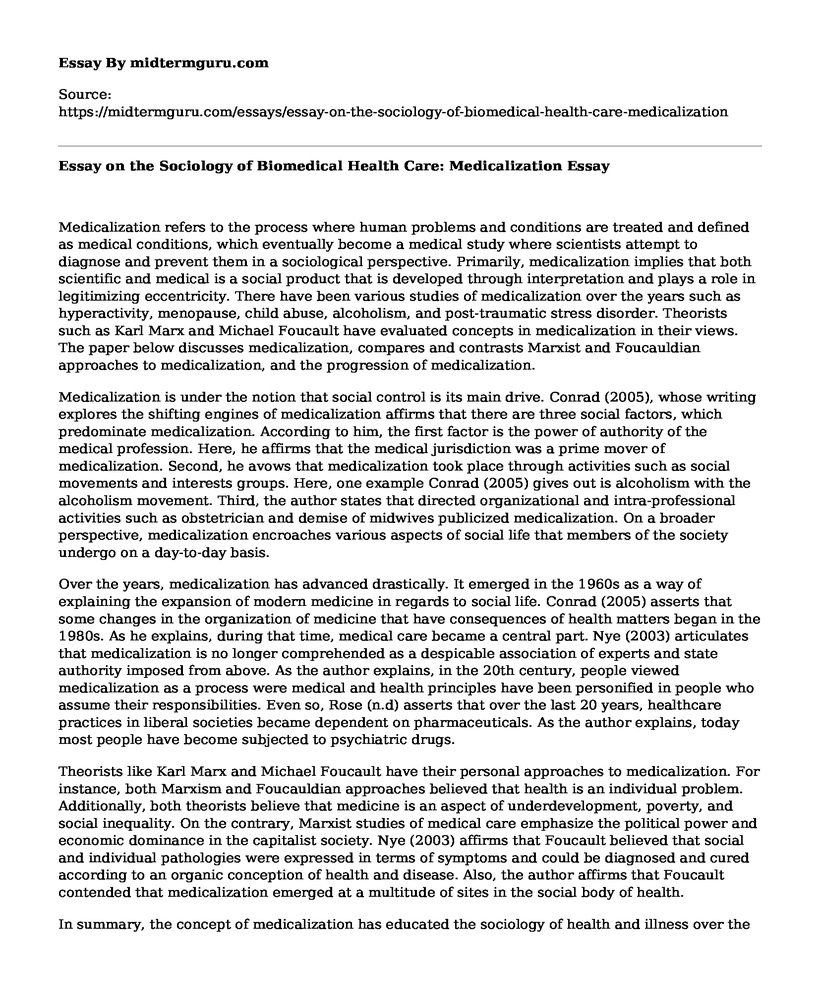Medicalization refers to the process where human problems and conditions are treated and defined as medical conditions, which eventually become a medical study where scientists attempt to diagnose and prevent them in a sociological perspective. Primarily, medicalization implies that both scientific and medical is a social product that is developed through interpretation and plays a role in legitimizing eccentricity. There have been various studies of medicalization over the years such as hyperactivity, menopause, child abuse, alcoholism, and post-traumatic stress disorder. Theorists such as Karl Marx and Michael Foucault have evaluated concepts in medicalization in their views. The paper below discusses medicalization, compares and contrasts Marxist and Foucauldian approaches to medicalization, and the progression of medicalization.
Medicalization is under the notion that social control is its main drive. Conrad (2005), whose writing explores the shifting engines of medicalization affirms that there are three social factors, which predominate medicalization. According to him, the first factor is the power of authority of the medical profession. Here, he affirms that the medical jurisdiction was a prime mover of medicalization. Second, he avows that medicalization took place through activities such as social movements and interests groups. Here, one example Conrad (2005) gives out is alcoholism with the alcoholism movement. Third, the author states that directed organizational and intra-professional activities such as obstetrician and demise of midwives publicized medicalization. On a broader perspective, medicalization encroaches various aspects of social life that members of the society undergo on a day-to-day basis.
Over the years, medicalization has advanced drastically. It emerged in the 1960s as a way of explaining the expansion of modern medicine in regards to social life. Conrad (2005) asserts that some changes in the organization of medicine that have consequences of health matters began in the 1980s. As he explains, during that time, medical care became a central part. Nye (2003) articulates that medicalization is no longer comprehended as a despicable association of experts and state authority imposed from above. As the author explains, in the 20th century, people viewed medicalization as a process were medical and health principles have been personified in people who assume their responsibilities. Even so, Rose (n.d) asserts that over the last 20 years, healthcare practices in liberal societies became dependent on pharmaceuticals. As the author explains, today most people have become subjected to psychiatric drugs.
Theorists like Karl Marx and Michael Foucault have their personal approaches to medicalization. For instance, both Marxism and Foucauldian approaches believed that health is an individual problem. Additionally, both theorists believe that medicine is an aspect of underdevelopment, poverty, and social inequality. On the contrary, Marxist studies of medical care emphasize the political power and economic dominance in the capitalist society. Nye (2003) affirms that Foucault believed that social and individual pathologies were expressed in terms of symptoms and could be diagnosed and cured according to an organic conception of health and disease. Also, the author affirms that Foucault contended that medicalization emerged at a multitude of sites in the social body of health.
In summary, the concept of medicalization has educated the sociology of health and illness over the years. As well, the developments in medicalization have contributed to the construction of new medical classifications in the industry. Ideally, the concept of medicalization has a dependence on science, medicine, doctors, and promotes consumerism. In general, in todays society, the medical discourse pervades the well-being of individuals in the society.
References
Conrad, P. (2005). The shifting engines of medicalization. Journal of Health and Social
Behavior, 46(1), (pp. 3-14).
Nye, R. (2003). The evolution of the concept of medicalization in the late twentieth century,
Journal of History of the Behavioral Sciences, 39, pp. 115B129.
Rose, N. (n.d). Neurochemical Selves. Retrieved from
http://ayp.unia.es/dmdocuments/umbrales17.pdf
Cite this page
Essay on the Sociology of Biomedical Health Care: Medicalization . (2021, Jun 14). Retrieved from https://midtermguru.com/essays/essay-on-the-sociology-of-biomedical-health-care-medicalization
If you are the original author of this essay and no longer wish to have it published on the midtermguru.com website, please click below to request its removal:
- Paper Example on Peplau's Theory of Interpersonal Relations
- Case Study: Elaine's Challenging Experience
- Which Conflict Management Strategies are Effective in Maintaining Relationships? - Paper Example
- The Tragedy of the Commons - Essay Sample
- Primary & Secondary Groups: A Comparison - Essay Sample
- Comcast: World's 2nd-Largest Cable & Broadcasting TV Company in US - Essay Sample
- Reflective Essay on Volunteering







